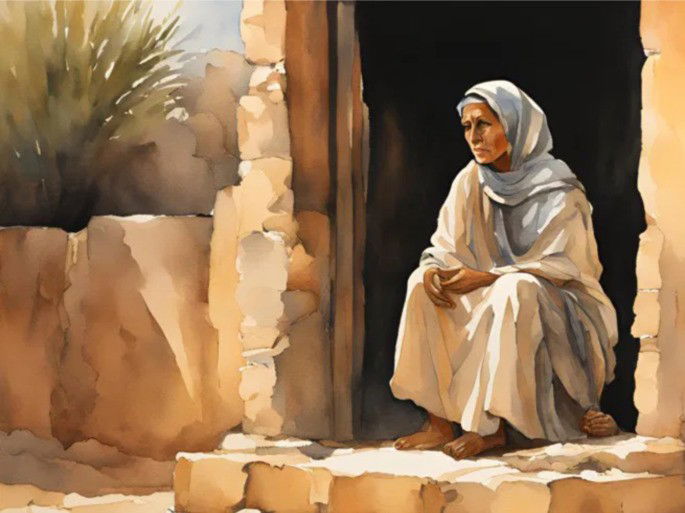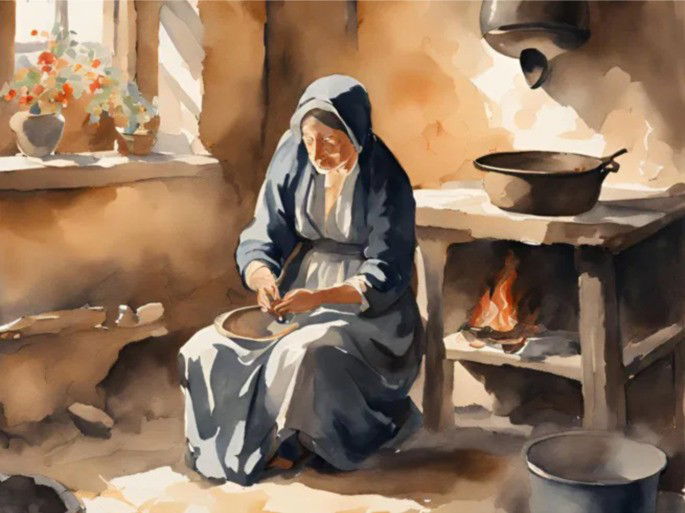The Widow of Zarephath is a woman whose story is told in the book of 1 Kings, chapter 17. She lived in extreme poverty during a drought and was also raising her son alone. God used her and her situation to demonstrate the value of faith and His power to provide.
During the lengthy drought, the widow went out to gather wood to prepare a final meal for herself and her son before dying of hunger. Elijah met her and asked for water and bread. Although she had only a little flour and oil, the woman trusted him and fed him. God multiplied her resources, and she had enough food until the end of the famine. The story of the widow is an example of faith, obedience, and how God provides in difficult times.
When Elijah met her, he asked for water and a piece of bread. Despite her desperate situation, she trusted Elijah’s promise that God would not allow her food to run out. Showing great faith and generosity, she made bread for the prophet first. As a result, her supply of flour and oil miraculously did not run out until the drought ended.
Later, her son became ill and died, but Elijah prayed, and God brought him back to life, further strengthening the widow’s faith. Her story highlights the importance of faith and obedience, showing that God can provide and perform miracles in seemingly hopeless situations.
Key Events in the Life of the Widow of Zarephath
- Her encounter with the prophet Elijah: Elijah asked the widow for water and bread during a great drought and famine.
- The miracle of provision: God multiplied the widow’s flour and oil until the end of the drought.
- The death and resurrection of her son: Elijah prayed to God, and God raised the widow’s son from the dead.
What Can We Learn from the Widow of Zarephath’s Life?
The story of the Widow of Zarephath teaches us lessons about faith and trust in God. Even when facing hunger and having only a little flour and oil, she showed great faith and generosity by feeding the prophet Elijah. Her decision to trust in God’s word spoken through Elijah, despite her own needs, is an example of faith in action.
When she prepared bread for Elijah, she believed in the promise that God would provide. That act of faith led to a miracle: her flour and oil never ran out during the drought. Additionally, when her son fell ill and died, Elijah prayed and God raised him, showing divine power and the importance of prayer.
The story shows that even in the hardest times, trusting God can bring relief and provision. The widow of Zarephath not only received food but also experienced God’s care and had her faith strengthened. This teaches us to trust God, even when facing serious challenges.
Bible Study on the Widow of Zarephath
The Encounter with the Prophet Elijah and the Miracle of Multiplication
When Elijah found the widow of Zarephath, she was in a desperate situation. During a severe drought that caused widespread famine, she went out to gather firewood to cook her and her son’s last meal, as her resources were nearly gone. When Elijah arrived, he asked her for water and a piece of bread.
Elijah gave her a promise from God: if she made bread for him first, her flour and oil would not run out until the drought ended. She trusted that promise and prepared the bread for Elijah.
And it happened just as Elijah said! The widow’s flour and oil multiplied so that they never ran out during the entire period of famine. Each time she used a little, more would appear. This miracle ensured that the widow, her son, and Elijah had enough to eat until the drought ended.
This miracle not only showed God’s provision but also strengthened the widow’s faith. She experienced God’s care and generosity in a direct and practical way. Her story teaches us about the importance of faith and obedience, even in great hardship.
The Death and Miracle Resurrection of the Widow’s Son
The death and resurrection of the widow of Zarephath’s son are powerful miracles performed by the prophet Elijah. After the continuous miracle of flour and oil during the drought, the widow faced a new tragedy: her son became seriously ill and died. This brought deep sorrow and despair to the widow, who had already endured much hardship.
She turned to Elijah, expressing her grief and questioning whether her son had died because of her sins. Elijah took the boy to his room, prayed fervently to God, and asked for the boy’s life to return. He stretched himself over the boy three times and cried out to God, pleading for his life.
God heard Elijah’s prayer, and miraculously, the boy came back to life. Elijah returned the child to his mother, who was amazed and grateful. This miracle not only reaffirmed God’s power but also strengthened the widow’s faith, showing that God cares and acts in times of extreme need and pain.
Applying the Faith of the Widow of Zarephath in Our Lives
Although the Bible does not tell us the widow of Zarephath’s name, she is remembered for her faith. Zarephath means “smelting place” or “refinery,” indicating a place of purification and transformation. In a smelter, metals are melted to remove impurities and to mold them into a purer, more useful form. And it was through adversity that her faith in God was tested.
The widow’s faith—trusting in Elijah’s word even during a famine—showed deep trust in God. She followed the prophet’s instruction and was blessed with continual provision of oil and flour during the drought.
In our homes, we can apply that faith by trusting God to meet our needs and by seeking spiritual guidance. Just as the widow was blessed for trusting the prophet, we should trust the words and guidance of those God sends to lead us. This strengthens our faith, brings security, and prepares us to receive God’s blessings even in hard times.
It is during delicate, resource-scarce moments that our faith is tested. The widow of Zarephath received the prophet but had to make a choice: believe in his word to experience the extraordinary. Let us follow her example—moving forward in faith, even when the situation seems difficult.
Read About Other Bible Characters:
- The Story of the Prophet Elijah
- The Story of Abigail: A Woman of Wisdom, Courage, and Faith
- Bible Characters: Their stories, traits, and significance


